How To Make Pickles In 2 Hours
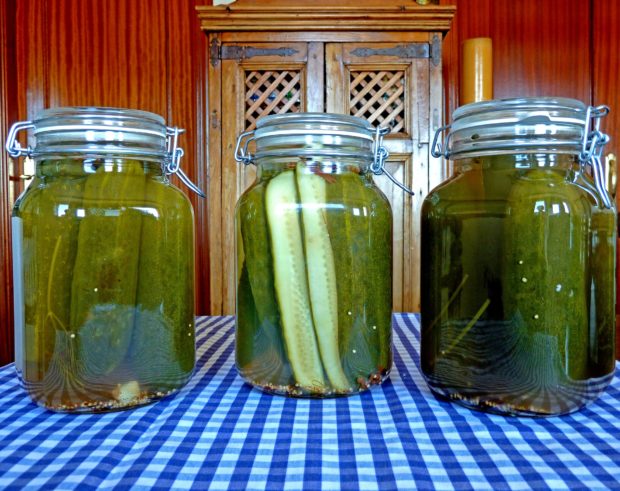
How To Make Pickles…ready to eat in 2 hours
No more chemical additives in my pickles.
Pickles are ridiculously easy to make at home?
You never need to eat chemically treated pickles again.
What kind of cuke should I use? I highly recommend
using either Persian or Kirby cucumbers.
They’re both classic and stay nice and crunchy. Use
Persian if you’re not so into seeds. That’s what I used
here. They also pack nicely because they’re super
straight and thin.
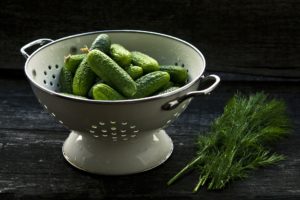
What type of vinegar?
I used white vinegar here so the flavor would be clean
and it wouldn’t discolor the pickle, but you could swap
for apple cider vinegar. Stay away from vinegars that are
overpowering, like red wine vinegar, sherry, or balsamic!
Yes! I kept it simple by adding a few crushed garlic cloves
and fresh dill, but feel free to get creative. (Add mustard seeds,
whole black peppercorns, or crushed red pepper flakes).
We love mason jars for the job, but you could even use an
old (washed) pickle jar. Just always be sure to use a clean
jar with a tight lid.
How long does it take to “pickle”?
I say wait at least 2 hours for the pickling to kick in,
If you can, try to give it 24 hours for max flavor.
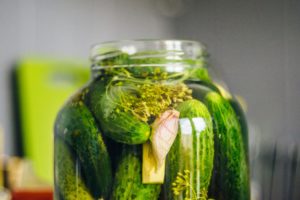
These pickles will *last for up to 3 months or more in your
fridge. I doubt you’ll have any left at that point. I
have tried 3 weeks so far and they’re good as ever.
I *Googled the opened jar fridge-life and read:
“pickles that have been fermented in some way (that
have not been pasteurized) continue to ferment, albeit
slowly, when stored in cool conditions like the fridge.”
Fermented foods USUALLY last for 3 months (to 3 years
in the fridge after opening), but will loose quality, taste and
texture as time progresses.
Many pickles are pasteurized or heat processed.
This kills off the bad and the good bacteria. Killing off the
invisible nasties (aka bad bacteria, and yeast that cause
spoilage is a great reason to pasteurize).
But a lack of good invisible beasties (bacteria, and yeast)
also means that once the jar is opened, there are no
invisible beasties populating the contents, and anything
can grow in there.
Pasteurized foods keep much longer than unpasteurized,
in the sealed container.
But once opened, pasteurized foods spoil considerably
faster than live cultured foods.
So even if your pickles are fermented, if they have been
pasteurized, I would personally defer to modern scientific
food safety wisdom (opposed to my more traditional
based approach).
Once you’ve mastered these classic pickles, the possibilities
are endless.
YIELDS: 10 SERVINGS PREP TOTAL TIME: 2 HOURS
You can adjust the taste and flavor to your liking.
I added twice as much water after my first taste because
they were too potent for me.
I subbed sea salt because I had no kosher salt. That was
why, but they were a bit too salty for my liking. I’d say 2
or 2½ tbs. of salt is enough. I used 1½ tbs. dried dill weed
because I didn’t have fresh dill on hand. That worked fine.
They are simply wow! And they are better after 24 hours.
INGREDIENTS
1 lb. Kirby or Persian cucumbers
3 cloves garlic, peeled and crushed
2 large sprigs fresh dill
1 cup water
3/4 cups white vinegar
1 tbsp. kosher salt
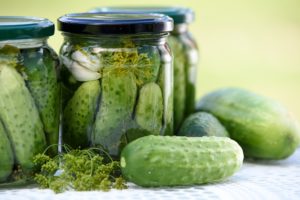
DIRECTIONS
1. Trim ends from cucumbers and slice into spears. Pack into 2
(16-oz. glass jar along with garlic and dill.
2. Make brine: in a small saucepan, combine water, vinegar, and salt.
Bring to a boil, stir until salt is dissolved, and remove from heat and let
cool slightly. Pour over cucumbers, seal the jar, and shake.
3. Let cool completely on the counter, then refrigerate until cold.
Wait at least 2 hours to eat the pickles, but the longer you wait,
the more flavorful they’ll be. If you can, try waiting 24 hours.
Inspired by
Recipe how-to-make-pickles
*https://food52.com/hotline/26823-how-long-to-
keep-an-opened-jar-of-half-sour-pickles-in-refrig



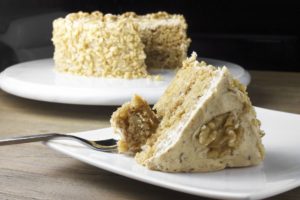

You must be logged in to post a comment.